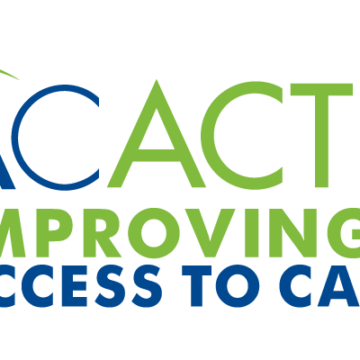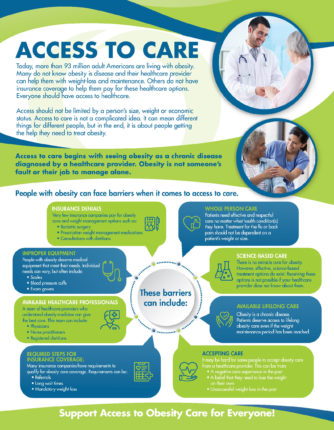Are you struggling to access obesity treatment due to insurance barriers/exclusions?

Obesity is a complex, chronic disease and people affected deserve to have access to science-based treatments that can help them improve their health. Treating obesity can also help improve or alleviate other health conditions such as diabetes, heart disease, osteoarthritis, cancer, sleep apnea and others. Unfortunately, it is too common for insurance companies to deny access or place barriers to receiving evidence-based obesity care.
You can help change how we care for and about obesity by ensuring that decision-makers such as legislators and insurance companies hear your voice. Help us to eliminate the stigma associated with obesity and make sure that obesity is treated as a disease, allowing for increased access to safe and effective medical treatment.
Below, you will find resources and actions you can take to learn about – and advocate for – better access to obesity treatment!
Coverage Fact Sheets
The OAC’s coverage and access to care fact sheets can help you advocate to legislators, employers, insurance companies and others about increasing access to obesity treatments. They offer hard-hitting facts about the current state of obesity and the value and effectiveness of science-based treatments. These resources can be used in letters about accessing care.
- Understanding Access to Care One-Pager
- Bariatric Surgery Coverage Fact Sheet
- Medical Weight Management Fact Sheet
- Obesity State Fact Sheets
Working with Your Insurance Provider
Individuals affected by obesity may rely on their insurance provider to assist them in the process of seeking access to safe and effective medical treatment. However, they often experience hurdles when working with their insurance, such as repeated denials of claims. The insurance process can also feel complicated, confusing, and both physically and emotionally draining.
Read about how insurance works and determine what kind of insurance you have in the OAC’s Working with Your Insurance Provider Guide. It offers tips for reviewing your insurance policy, working with your insurance provider, tools for making appeals, and more. Although originally written to help with access to bariatric surgery, this guide contains a good explanation of insurance with content that can be modified to fit any obesity treatment.
Once your healthcare provider has recommended a treatment, utilize the OAC sample letter to inquire about coverage.
Working with Your Employer
Unfortunately, coverage of obesity care is not always standard. Employers usually have to opt-in or request such coverage. Sometimes, all it takes is an employee asking for such coverage to be added. Write your employer to urge coverage of obesity care (if you have employer-based healthcare – see Understanding Your Insurance Policy above).
This is an outline of a sample letter requesting coverage for obesity treatments. If you need additional resources to help populate these letters, please see the coverage fact sheets above which provide great content.
Working with Your Healthcare Provider
Stay in contact with your obesity care provider. Your obesity care provider and their insurance/billing/pre-authorization departments are great resources for information on access challenges (they should also be involved in any appeal). Don’t have a provider yet? Check out OAC’s Obesity Care Provider locator to find one.
Contact Your State Department of Insurance
Contact your State Insurance Commissioner and/or Department of Insurance to share your story.
Select your state to directly file the complaint with this resource from the National Association of Insurance Commissioners. Please keep in mind that not all insurance is regulated by the state (see materials in Understanding Your Insurance Policy above), but letting the insurance department know of your challenges is always important!
Reach Out to Your Elected Officials
Insurance coverage is highly regulated by both your State and Federal elected officials. OAC strongly urges you to write your elected officials to make them aware of your personal story and the barriers you are facing. You can look-up your elected officials using the OAC Legislative Look-up Tool. Simply follow through the links to reach out to your elected official via web form or through social media. Remember, your story is powerful. Please share it!
OAC is also targeting a number of legislative and policy issues and have pre-created messages you can send to your elected officials. To see the issues and targets, visit the OAC Action Center.
Share Your Access Issues with the OAC
Share your access issue with the OAC Access to Care Committee using the OAC’s Report Issues Form.
OAC’s Access to Care Committee regularly reviews all access challenges that have been submitted. The Committee does offer advice in some situations, but not all. Please share your access issue with us as it helps us understand barriers throughout the country and develop actions to help eliminate such barriers.
Share Your Challenges on Social Media
Share your access challenges on social media. Social media has changed advocacy; a single tweet or Facebook post can spur action. Consider sending a tweet or posting your story on social media.
When posting to social media, always use respectful language and keep your message clear and concise for others to read. If you have relevant images on hand, you should include one. You can also use hashtags to amplify your message for others to track online. Not sure what hashtags to post with? Try these:
- #OACAction
- #STOPtheWaitNow
- #HealthReform
- #SpeakforHealth
Here’s a sample tweet:
- “@FLBlue is denying me access to evidence-based #obesity care. Please join me in urging them to expand access so myself and others can find the #obesitycare we need and deserve. #OACAction #STOPtheWaitNow”


